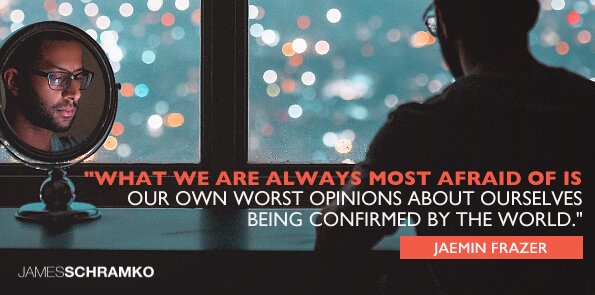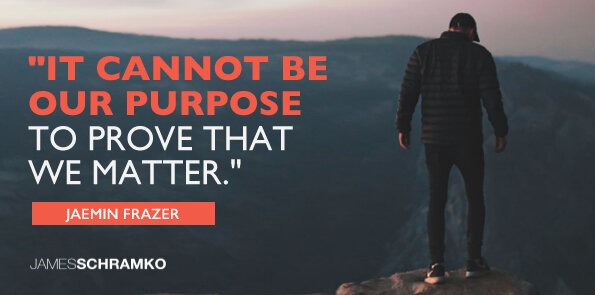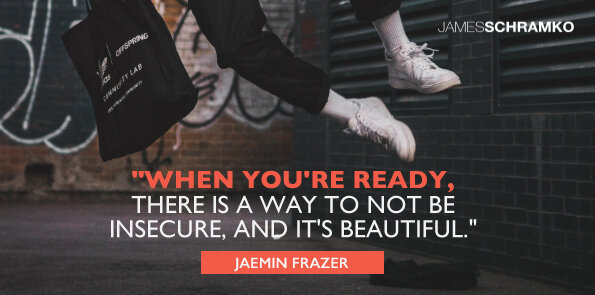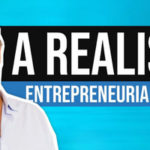Podcast: Download (Duration: 38:15 — 35.8MB)
Get Notified Of Future Episodes Apple Podcasts | Spotify | Amazon Music | Android | Blubrry | Gaana | TuneIn | Deezer | Anghami | RSS | More
Insecurity is something that affects us all to varying degrees. It is, however, a solvable problem, and this episode’s guest, Jaemin Frazer, has guided many towards self-assurance and a recognition of their worth.
In this guesting, Jaemin talks with James about the judgment-free approach that characterizes his coaching.
They’ll discuss how self-awareness, while challenging to achieve, serves as the starting point of recovery from insecurity.
And they’ll look at the way insecurity can fuel great achievement but be detrimental in the long term.
Table of contents
1. A book worth checking out
2. A specialty in insecurity
3. Lessons on judgment
4. On addressing depression…
5. The need for self-awareness
6. Going out and risking critique
7. Separating behavior from intention
8. Get help from someone who doesn’t care
9. How realistic are your expectations?
10. Is imbalance a given for success?
11. Advice for the young guns
12. Seeing the recurring pattern
13. After the aha moment…
A book worth checking out
Jaemin’s book “Elegantly Simple Solutions to Complex People Problems” was first recommended to James by his trusted friend and resource guide, Dan Dobos.
Much like Dan, James strives to be a reliable resource for his podcast listeners. He has actually bought numerous copies of Jaemin’s book over the past year to help people who need its insights, especially those seeking advice on mindset and dealing with difficult situations.
The book’s relevance is particularly evident in James’s work, where he assists people closely and often encounters individuals who are not achieving their desired results due to solvable issues.
James looks forward to discussing the book on his show, recognizing its potential value for his audience, some of whom have already benefitted from working with Frazer.
Jaemin is grateful to be a guest and shares his passion for helping people navigate their struggles and “uncharted territory.” He believes that clear thinking and providing a guiding framework can lead to extraordinary possibilities for individuals feeling stuck. This reflects the essence of his book and its application in real-life situations.
A specialty in insecurity
James and Jaemin recently connected through social media, thanks to a client of James who tagged Jaemin after reading his book by James’s recommendation. James would like Jaemin to talk, first of all, about his specialization and the focus of their podcast episode.
Jaemin has branded himself as “The Insecurity Project,” focusing exclusively on personal insecurity as a solvable issue, despite his business coach advising against it. His coach warned that insecurity is a sensitive topic, and people are often insecure about their own insecurities, which could make this a challenging field to work in.
Jaemin nevertheless chose to pursue this path, addressing a problem that is deeply felt yet often unresolved by those who experience it.
Lessons on judgment
Jaemin takes a unique approach in his coaching, particularly regarding judgment in human interactions.
Jaemin shares a lesson his father gave him on judgment. A sheep farmer, Jaemin’s father once asked him if wool burned. Recalling an ad he’d seen on TV, Jaemin replied that it didn’t. His father applied a match to a handful of wool, and straightaway it caught fire. Removing the match, however, the fire went out. In the same way, Jaemin’s father said, people often seem inflamed by issues, but the fire is fueled by external factors.
This suggested that in coaching, the issue often lies in the coach’s judgment and desire for the client’s success. This desire, Jaemin argues, places the coach in a position of superiority, which, while well-intentioned, can be unhelpful and create resentment.
Jaemin stresses the importance of a judgment-free space in coaching, proposing the controversial idea of seeking help from someone who doesn’t care about you. By doing this, a coach can create a safe environment for honest conversations without the pressure of living up to someone’s expectations. This method allows for more empowering and transformative discussions, free from the bias of the coach’s emotions or judgments.
James draws a parallel to his experience selling cars. He would tell customers their motoring problem wasn’t a problem of his, illustrating a detachment that empowered the customer to make their own decisions.
This detachment, similar to Jaemin’s approach, underlines the importance of clients making choices based on their needs, not out of a coach’s desire for their success.
Jaemin has beef with the superficial and generic encouragements often found in self-help material, stressing instead the importance of self-reliance and personal accountability.
He advocates too for “embodied wisdom,” where a coach should have personally overcome the issues they help others with. This approach ensures the coach’s advice is grounded in personal experience and success.
On addressing depression…
James has had a profound realization about people who are depressed, or as he’s heard it defined, those who don’t know what they want. It aligns with Jaemin’s understanding that people often cling to unhelpful behaviors because they derive some benefit from them.
For example, someone might maintain a “down” behavior because it leads others to do things for them, effectively making it advantageous to stay in that state.
Jaemin shares a story about a client with long-term depression, highlighting the powerful realization that came from asking, “How is this depression not a problem for you?” This question, asked in a judgment-free space, led the client to acknowledge that he used depression as a shield or a ‘magic card’ to avoid vulnerability and responsibility.
James reflects on that ‘aha moment’, when people understand that continuing a particular behavior is due to the payoffs it provides.
Jaemin says these behaviors are often rooted in deep-seated insecurities and fears, particularly the fear of having one’s worst opinions about oneself confirmed by others.
James touches on the book “The Courage to Be Disliked”, which shares a similar philosophy to Jaemin’s approach. It suggests that many of our actions are driven by the fear of being disliked or perceived negatively by others. Addressing and overcoming these fears can lead to a significantly different and potentially more fulfilling life.
The need for self-awareness
James and Jaemin discuss the importance of self-awareness and the challenges people face in achieving it.
Jaemin points out that while most people desire to be good, they often fear that some part of them is not. This fear of exposing their perceived flaws leads many to avoid self-examination. Jaemin describes his role as coaxing people to confront these fears, emphasizing that understanding and addressing one’s past is essential for personal growth, despite the common resistance and anxiety surrounding the process.
James acknowledges that creating a safe space for self-awareness is a crucial first step. Jaemin highlights, however, the difficulty many people have in confronting their fears and insecurities. Hard as it is, the act of examining these fears is crucial as it often reduces their power, revealing that they may be based on outdated or incorrect self-perceptions formed in early life. The process is a significant, yet challenging, aspect of personal development.
Going out and risking critique
A side thought for James is the challenges and fears associated with exposing oneself to public critique, especially for entrepreneurs and public figures. He knows the risk of being trolled or criticized online, and has concern about the impact of personal attacks on individuals.
The key, says Jaemin, is self-validation and internal security. He advocates living a life with nothing to prove or defend, saying that self-worth shouldn’t hinge on external validation or success.
Jaemin adds that having a strong sense of self and being one’s own validator can provide insulation against external criticism. He believes that even if he faced significant personal or professional losses, his self-assessment and confidence would remain intact. This perspective, he argues, is crucial for entrepreneurs to maintain their authenticity and resilience in the face of potential public backlash or failure.
James agrees, recognizing the liberation in that kind of mindset and how it enables one to maintain power and freedom in their actions, even amidst adversity.
Separating behavior from intention
Jaemin, referencing Tony Robbins’ work on six core needs, emphasizes the distinction between behavior and intention. He explains that behaviors are often misinterpreted as indicators of character, but they are actually the outcomes of deeper needs and beliefs.
This understanding allows for a more compassionate view of one’s actions, recognizing them as attempts to fulfill core needs like certainty, variety, and love, rather than as definitive reflections of character.
So it’s important, asks James, to always be curious about one’s own actions?
Without judgment, says Jaemin. He argues that to truly understand and improve oneself, it is crucial to explore motivations and past behaviors without self-condemnation. This non-judgmental approach enables a safer exploration of personal history and behaviors, fostering personal growth and self-awareness.
It’s a difficult task, Jaemin acknowledges, due to inherent subjectivity and biases. James agrees, self-assessment can be complex given our natural resistances.
It’s a matter again of separating actions from inherent worth, allowing for a healthier self-perception and personal development.
Get help from someone who doesn’t care
Jaemin suggests that a crucial step in overcoming insecurity is seeking help from a person who is emotionally detached, much like a wise mentor in the hero’s journey. This person, like Gandalf or Yoda, provides guidance and creates a safe space for self-exploration, offering objective insight that may be challenging to achieve alone.
James resonates with this concept, speaking of the importance of such guidance in a business context as well. He recognizes that the success of small businesses often reflects the personal development of the individuals behind them. This multi-dimensional aspect underscores the significance of external, unbiased support in both personal and professional areas.
How realistic are your expectations?
In discussing the concept of realistic expectations, Jaemin critiques the popular notion of setting grand, unattainable standards. Striving for extraordinary achievements, he says, can often stem from an individual’s need to validate their existence and prove their worth.
Jaemin argues that this approach is damaging. It is not one’s purpose to prove their significance but rather to recognize their inherent worth and update any narratives that suggest otherwise.
Jaemin advocates for setting goals that are sustainable, beneficial for both the individual and others, and not driven by a sense of neediness or a mission to validate oneself.
He warns against the destructive patterns often seen in those who chase unachievable goals, leading to chaos and long-term disappearance from the public eye or professional spheres.
Is imbalance a given for success?
James reflects on the concept of imbalance in the pursuit of success, touching on the hustle culture and its impact on individuals. He wrote his book “Work Less, Make More,” largely to challenge the ethos of overworking.
James notes that society often idolizes successful figures despite their apparent personal and ethical shortcomings. He gives examples like Henry Ford’s authoritarian approach, Elon Musk’s extreme work habits, Bill Gates’ controversial reputation, and Gary Vee’s constant hustle. These all illustrate priority of success or wealth over other aspects of living.
As a mentor James sees a trend in the business world where success is measured in financial milestones, with entrepreneurs fixated on reaching specific monetary goals – 1 million, 10 million, a hundred million dollars.
He discusses, too, his experience working with different age groups, noting a shift from helping older individuals to now primarily assisting younger entrepreneurs aged 25 to 35. These younger clients, often having only worked in the online sphere and without family commitments, reflect a generational change in the perception and pursuit of success.
James questions the sustainability and wisdom of single-minded success metrics, considering his broader life experience and perspective on what constitutes a balanced and fulfilling life.
Advice for the young guns
Our two experts reflect on the journey of personal and professional growth, particularly in relation to young people driven by ambition and societal pressures.
James shares his personal experience from younger days striving for material success and external validation. With time, he shed the need for external symbols of success, like wearing a Rolex, and learned to find self-validation. This transition reflected a deeper understanding of what truly matters in life, beyond superficial achievements.
Jaemin speaks of insecurity as a powerful motivator in one’s 20s, often leading to remarkable achievements. He warns, though, of the detrimental long-term effects of insecurity-driven success, which can lead to a chaotic life and a disconnect with oneself. Beyond midlife, he says, being driven by insecurity can be perceived negatively, marking a descent into madness. Thus the importance of recognizing and overcoming insecurity for sustainable personal growth.
James aims to play a values-based, ethical game in life and business. His own drive in his 20s, however, was admittedly fueled by insecurity, which he eventually overcame to reach a place of contentment and self-assurance, fruits of personal growth and experience.
Jaemin acknowledges youthful ambition and insecurity are inevitable, but advises readiness for the transition from insecurity to security. He suggests that true growth and meaningful contributions to the world come from security and self-confidence. This transition from proving oneself to contributing positively is a critical development in one’s life, leading to a more fulfilling and impactful existence.
Seeing the recurring pattern
James and Jaemin have seen the predictability of human behavior and life patterns, especially in the context of personal and professional growth.
People often approach James admitting his predictions about their life and business trajectories were accurate. He understands these patterns through his own experiences and offers guidance, albeit with warnings about the implications of certain goals.
Jaemin agrees, noting that people often perceive their problems as unique and complex, but in reality, they are usually predictable and solvable with a pragmatic approach. He refers to his book, “Elegantly Simple Solutions to Complex People Problems,” which explores these concepts in more detail, providing a structured way to understand and resolve common personal challenges.
James endorses Jaemin’s book and work, highlighting the value of such resources for his podcast audience.
After the aha moment…
Has Jaemin any actionable advice for those experiencing the aforementioned “aha moment”?
Jaemin suggests using two diagnostic tests he developed to measure the impact of insecurity in various life areas. These tests help bring awareness to aspects of one’s life previously unnoticed, sparking curiosity about how to address these issues. If the tests reveal significant costs due to insecurity, it motivates individuals to seek solutions; if not, they know where to turn when the need arises.
All of that can be found at jaeminfrazer.com.
Enjoyed the show? Leave us a review on iTunes













Leave a Reply